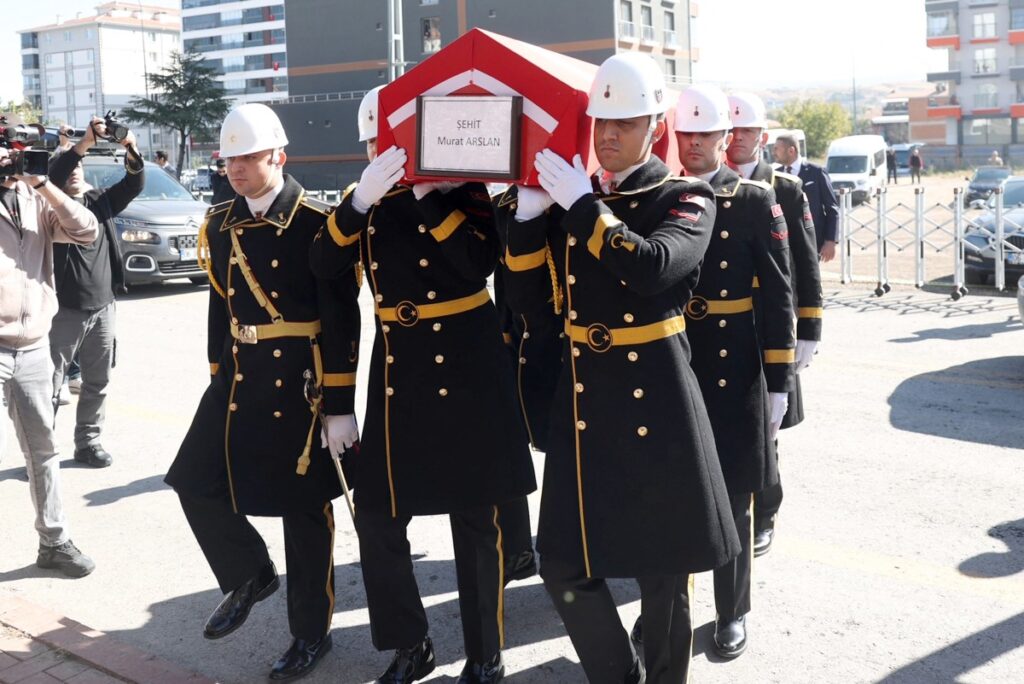Militants from the outlawed Kurdistan Workers’ Party (PKK) on Friday claimed responsibility for an attack on a Turkish defense contractor that killed five, with officials saying the perpetrators infiltrated from Syria and carried out the attack, Agence France-Presse reported.
The Turkish government said it had proof the PKK was behind Wednesday’s attack on a top defense contractor near Ankara, and hours later its warplanes bombed militant targets in Iraq and Syria.
The attack on state-run Turkish Aerospace Industries (TAI) “was carried out by a team from the [PKK’s] Immortals Battalion,” the group said on Telegram.
It said the attack by two PKK militants, a man and a woman, had been “planned for a long time,” denying any link to recent developments — a reference to the Turkish authorities apparent softening towards a negotiated solution to a decades-long conflict.
The PKK, which has waged an on-off insurgency against the Turkish state since 1984, is designated as a terrorist group by Turkey and its Western allies.
In 2011 President Recep Tayyip Erdoğan gave his blessing to several backchannel peace efforts in a bid to resolve the so-called Kurdish issue, but the fragile truce collapsed in 2015 in a fresh round of violence.
Since then, Erdoğan’s Justice and Development Party (AKP) government along with its junior partner, the far-right Nationalist Movement Party (MHP), has kept up military pressure on the Kurdish rebels.
On Tuesday the MHP’s leader created shockwaves by offering an olive branch to jailed PKK leader Abdullah Öcalan, suggesting he come to parliament to renounce terror and dissolve his movement.
A day later, Öcalan — who has been held on a Turkish prison island since 1999 — received his first family visit since 2020.
His nephew, Ömer Öcalan, a lawmaker from the pro-Kurdish Peoples’ Equality and Democracy Party (DEM Party), confirmed the visit on X, saying the family had last seen him on March 3, 2020.
DEM Party officials reportedly suggest Öcalan may tell the PKK to lay down its arms, as he did in a letter in 2013.
But the visit had only just ended when the Ankara attack began.
‘Heavy price’
Erdoğan vowed there would be no let-up in the fight against the PKK, saying the overnight bombing campaign had made “the terrorists pay a very heavy price,” in comments quoted by state-run TRT television and other media.
He said the attackers came “through an infiltration from Syria” and that one of them “blew herself up,” his remarks confirming media reports that what began as a shooting attack also included a suicide bombing.
A Syria war monitor said Friday that Turkish drone strikes had killed 27 civilians in Syria in a 24-hour military escalation following the deadly attack.
Turkish forces had “dramatically escalated their aerial and ground attacks in north and east Syria,” said the Syrian Observatory for Human Rights.
It said it documented 45 drone strikes and four by fighter jets targeting infrastructure including water and power networks and gas stations.
The Turkish army denies claims it hits civilian targets.
Erdoğan chaired a security meeting in İstanbul on Thursday soon after he returned from Russia, where he joined the BRICS summit of major emerging economy nations.

